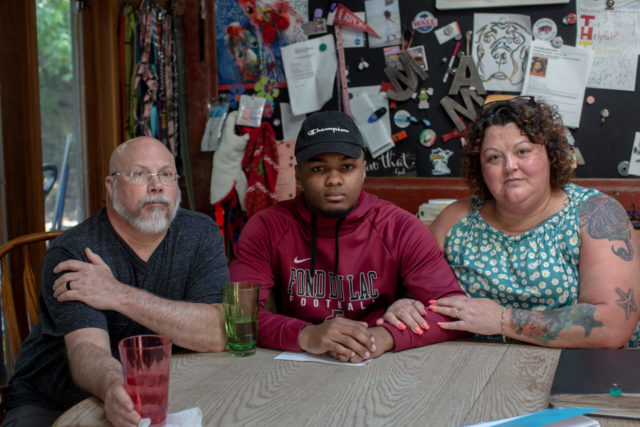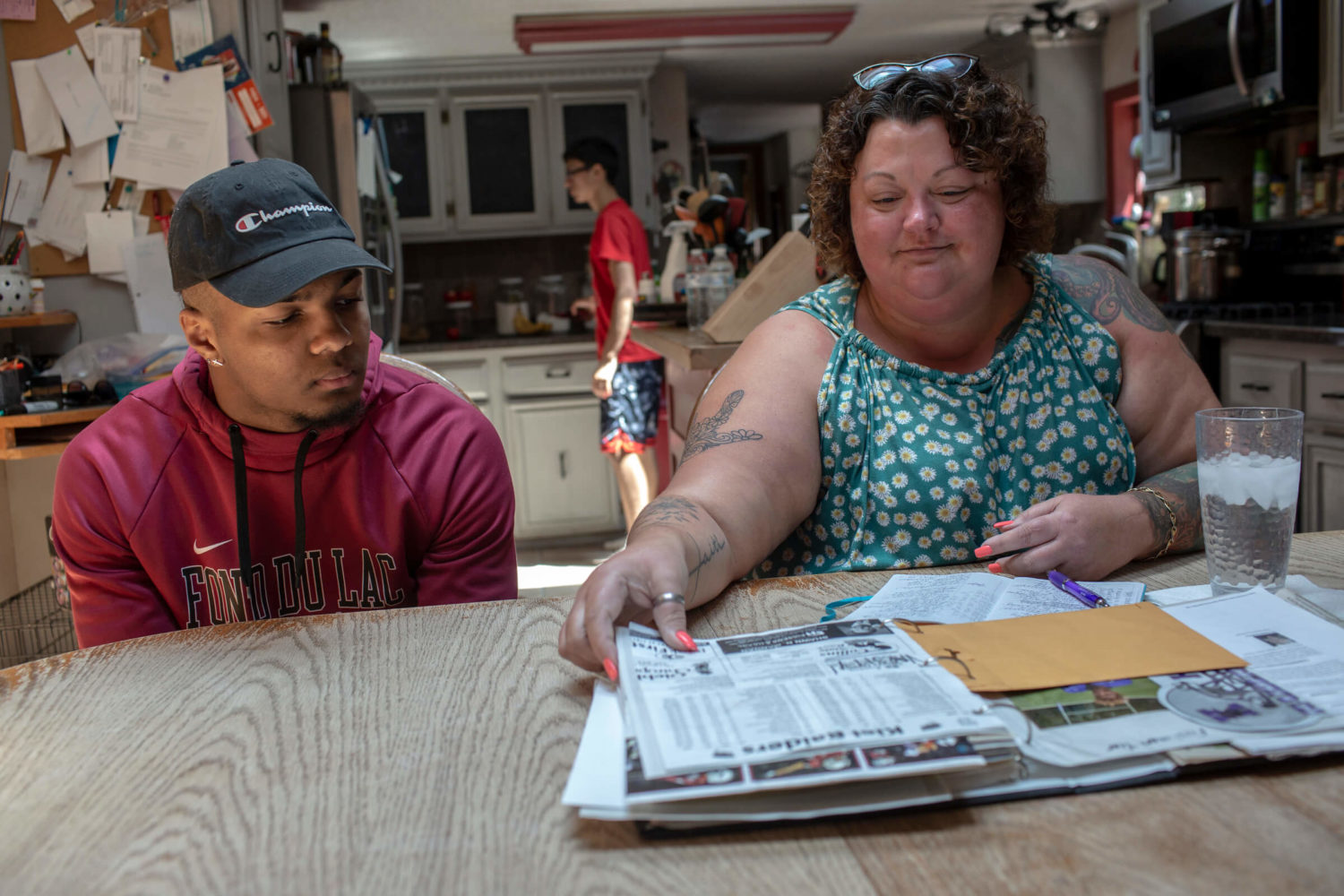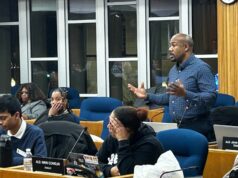
The Wempner family felt like prisoners as they sat in their house in early June — surrounded by woods on their 6-acre lot outside of Kiel.
Their usually sleepy northeastern Wisconsin town had transformed into a culture war battlefront, stoking fears of violence. Parents of three middle school boys, along with a conservative law firm, pushed a one-sided story that went viral across conservative media: That the Kiel school district was investigating the boys for allegedly using the wrong pronouns to address a transgender student.
Backlash to the story drew national headlines. It culminated in a series of bomb threats over nine days that paralyzed the city’s government, ended the school year early and left many longtime residents feeling that their town had been hijacked by larger forces.
Unexamined until now is how documented acts of racism provided the kindling for Kiel’s political eruption. That story started in 2020 when Amy Wempner discovered racist Snapchat messages sent about her son Armond — one of five Black students at Kiel High School that year.
The family’s push for the school district to respond triggered a domino effect: As part of a legal settlement, the school district ultimately brought on a consulting firm to conduct training about racism and harassment. But well-organized Kiel parents accused the firm of advancing critical race theory, which residents — echoing conservative pundits on TV — described as an infiltration of Marxist and anti-white ideology. That movement propelled the ousters of three school board members.
It also prompted Armond to transfer to another school district. In a federal lawsuit filed in October, the family accused the Kiel school district of violating Armond’s civil rights by failing to appropriately address racial hostility.
In June, as police hunted for whomever was threatening to blow up Kiel, the Wempners feared violence could strike at any moment.
“I’m honestly trying to decide whether I should put bullets in my pistols and have them handy,” Dan Wempner said, as he leafed through a scrapbook of photos and newspaper clippings of Armond’s athletic accomplishments.
“But I also don’t want them handy because the kids might find it.”
Armond’s experience mirrors that of students of color in some other Wisconsin schools. And it illustrates how a Republican strategy to mischaracterize discussions of race and biases as political indoctrination can prevent schools from protecting students from documented acts of racism.
Rhetoric around critical race theory — an advanced academic concept that Republicans have branded a catch-all for inclusivity efforts — is only escalating ahead of the high-stakes November election in Wisconsin and across the country.

Football star finds family
As his family tells it, Armond Wempner carried high hopes when he moved to Kiel in the fall of 2017, the start of eighth grade.
Armond looked to reinvent himself after spending most of his life in the foster care system. He shuffled between families until Amy and Dan — both of whom are white — adopted him. He gained three younger siblings and soon called Amy “mom.”
Despite being among few Black students in a 94% white city, he didn’t feel like an outsider. His athletic talent cast him as a rising football star in a community that swelled with pride for its Kiel High Raiders.
“I just wanted to put Kiel in the spotlight,” Armond said. “To show people that just because we’re a small town, that doesn’t mean we can’t produce athletes.”
He grew into a 6-foot-tall, 180-pound linebacker who excelled on defense and ran a 40-yard dash in 4.5 seconds, top-tier speed for a high school athlete. He would sack a quarterback five times in a game, the second most in state history.
Armond’s personality made him equally magnetic off the field, his mom said. When Amy led Sunday school classes, Armond helped. When a young fan took a shine to him, Armond showed him around the football field after games.
“He’s that kid who brings you in,” Amy said. “He was just a huge hit.”
Facing racism in Kiel
But sometimes-overt, sometimes-casual acts of racism would mar Armond’s high school experience.
Shortly after Armond moved to town, he and Dan said they listened in bewilderment as the teenager’s basketball teammates told racist jokes about Black people during a tournament trip. The coach did nothing to stop it, they recall.
Dan said he remained silent, not wanting to complicate Armond’s life by jumping to his defense.
“I still carry shame for not stopping it back then,” Dan said. “But I just thought, when you’re with the lions, you have to act like a lion.”
In 2019, a white football player said the N-word during class, according to the Wempners’ legal complaint, filed in the U.S. District Court for the Eastern District of Wisconsin.
A teacher heard the slur and reported it to administration, prompting the school to suspend the student from games. A group of students campaigned to “free” the football player from suspension, the lawsuit said.
A teacher separately documented an incident in which several middle school boys cornered Armond’s younger brother, who has autism, and forced him to utter the N-word.
Armond initially shrugged off the racism he experienced.
“You just kind of go along with it and laugh it off, otherwise you’re the bad guy,” Armond, now 18, said in an interview at his home. “It’s not right, but people here aren’t used to being around African Americans, or even different ethnicities.”
But an incident in July 2020, the summer before Armond’s junior year, upended that status quo. Amy picked up Armond’s phone to discover that his football teammates had shared messages in a Snapchat group he was part of that advanced demeaning racist stereotypes and described Armond as a criminal because of his skin color.
Amy asked her son how long this had been happening.
“Since I moved here, mom,” he told her.
This time, Amy wouldn’t let it slide.
District acknowledges racial harassment
As the Minneapolis police murder of George Floyd set off nationwide protests against racial injustice, Amy sought to make Kiel schools more welcoming to students of color.
She took the Snapchat messages to the football coach, its athletic director and Brad Ebert, the district’s superintendent.
Ebert downplayed the messages and asked Armond what he did to prompt the vulgarities, Amy said. In a separate meeting, the athletic director Steve Walsh said he “wasn’t surprised” to hear of the bullying and said “a transfer (out of the district) would probably be best” for Armond, according to the lawsuit.
Asked for comment, Ebert told Wisconsin Watch in an email that the school district could not respond to the Wempners’ statements or otherwise comment for this story, citing the lawsuit.
By August 2020, Ebert acknowledged in a letter that unlawful racial harassment occurred. Amy expected little action, so Elisabeth Lambert, an ACLU attorney, helped her escalate the complaint to the Wisconsin Department of Public Instruction.
Months of negotiation yielded an out-of-court settlement in which the district agreed to hire an outside consultant to educate staff and students about responding to racism and harassment.
Teachers would then incorporate the training into classroom lessons. The district also agreed to clearly outline to parents how it planned to respond to the harassment complaints. The state DPI was to ensure the district followed through.
Similar complaints statewide
Kiel’s response to the Wempners’ initial complaint fits a pattern playing out across Wisconsin, said Lambert, who has represented families describing similar treatment in Chippewa Falls, Cedarburg, Greendale, Oshkosh and Burlington.
“Many districts have taken an approach to the investigation that’s more focused on dismissing or controverting the allegations as opposed to actually developing necessary facts and fully exploring the case,” Lambert said.
For instance, the Cedarburg School District challenged the Department of Public Instruction after it ordered the district to fully investigate allegations that a biracial student faced persistent racist slurs, jokes and comments.
Even after acknowledging racial harassment, some school districts — including Kiel’s — have failed to act, leaving oversight to already-traumatized subjects of harassment, Lambert said.
Partisan attacks citing critical race theory only complicate attempts to address documented racism in schools, she said.
“People who are in that kind of anti-CRT camp will try to tar my clients or me as Marxist agitators who have got some sort of ulterior motive to corrupt kids and bring in curriculum or ways of teaching that that they think are inappropriate.” Lambert said.
“We’re trying to help kids, and this culture war pushback is happening.”
Feeling increasingly uncomfortable in Kiel High School, Armond transferred to a more diverse school in Fond du Lac.
In August 2020, Armond asked the Wisconsin Interscholastic Athletic Association to waive the requirement that he miss a year of varsity sports due to the transfer.
“I don’t want to continue to go to school in Kiel because I feel like I don’t belong,” Armond wrote in his request.
“I just want to be a normal kid. I play football, I wrestle and I am a sprinter. I have worked so hard in Kiel to earn my positions on the varsity squads,” he added. “Please don’t make me sacrifice even more in order to go to a school that doesn’t single me out based on my race.”
The association granted the waiver. For the next two years, Armond would make the 90-minute round trip to Fond du Lac High School.
CRT opponents mobilize
Armond’s transfer came after some parents protested efforts to respond to racism in Kiel schools.
Distrust in the school board initially simmered during protests of the school’s COVID-19 masking policies. But as parents mobilized, their grievances broadened to gender and racial issues, protesting steps required of the Wempner settlement and reacting with outrage to public discussions about diversity after multiple families of color complained about harassment.
Opponents cast their children as victims of a reverse-racist plot to reshape Kiel using critical race theory.
Often shortened to CRT, critical race theory is a decades-old academic concept asserting that white supremacy from America’s past lives on in its laws and institutions — shaping today’s racial disparities. Wisconsin is home to some of the nation’s starkest disparities between white and Black residents in education, public health, housing, criminal justice and income.
Opposition to CRT soon dominated Kiel’s school board meetings. Anti-CRT parents flooded social media with misleading information. They pressured the school district to stop working with the firm it brought on for anti-racism training under the settlement: Great Lakes Equity Center, which provides training upon request to public school districts and other governmental agencies.
Brandon Gibbs, a parent of two district students, initiated the campaign against the consulting firm. In a 21-page letter to the school board, Gibbs accused the firm of advancing CRT, citing statements about anti-racism on its website. Neither he nor the firm responded to requests for comment.
Gibbs also expressed outrage that his daughter’s class watched a video about diversity that mentioned systemic racism and white privilege. That exercise signaled CRT’s arrival in Kiel, he wrote.
Gibbs wrote that CRT counters Dr. Martin Luther King’s dream of equality because “it assigns collective guilt and ascribes character traits to people based only on the color of their skin.”
Stuart Long, a Kiel school board member, said Gibbs’ email was “the first indication that the local pushback to CRT was morphing into something much bigger.”

Weaponizing critical race theory
The criticism echoed anti-CRT rhetoric heard across partisan media. It emerged as conservative activist Christoper Rufo publicly outlined a strategy to usher CRT backlash into mainstream politics — weaponizing the academic concept to encompass all “woke” racial and identity ideologies that progressives back and conservatives scorn.
“We have successfully frozen their brand — “critical race theory” — into the public conversation and are steadily driving up negative perceptions,” Rufo, who declined to be interviewed for this story, tweeted in March 2021. “We will eventually turn it toxic, as we put all of the various cultural insanities under that brand category.”
Rufo’s strategy proved wildly successful as he expanded his platform through appearances with conservative stars like FOX News’ Tucker Carlson, who routinely advances the conspiracy theories of white nationalists. Conservative groups now hold anti-CRT talks nationwide, including an October event in Waunakee, Wisconsin called “Poisoned: The insidious ideologies in your schools.”
The UCLA School of Law is tracking more than 500 anti-CRT efforts introduced at the local, state, and federal levels since 2021. In Wisconsin, the Republican-controlled Legislature in early 2022 passed a bill to prohibit educators from referencing a host of concepts, including “critical race theory,” “multiculturalism,” “equity” and “social justice,” before Democratic Gov. Tony Evers vetoed the bill.
At least five Wisconsin school districts have adopted anti-CRT measures — from the tiny northern city of Mellen to the Milwaukee suburb of Waukesha.
In the race for Wisconsin governor, Republican Tim Michels has frequently called for schools to teach more “ABCs and less CRT,” adopting a popular party talking point.

alleged bullying of a transgender student. (Lianne Milton for Wisconsin Watch)
While schools may educate students about racial bias, K-12 teachers do not teach CRT, which is generally limited to graduate-level coursework in universities, said Jamel Donnor, a professor of education at William & Mary and an expert on CRT and school desegregation.
But misleading claims about CRT in classrooms persist, he said, through a “calculating and concerted” political strategy to “speak it into existence.”
Those raising alarms about CRT claim the framework fuels divisions by categorizing white people as oppressors and students of color as victims. Donnor rebuts that characterization.
CRT emerged out of attempts to understand how law has been used to perpetuate inequality along the lines of race — as well as class, gender and sexual orientation, Donner said.
“One of the misperceptions of critical race theory is that it is anti-white, when nothing can be further from the truth,” he added. “It’s been created as this boogeyman — a phantom menace that doesn’t exist.”
Speaking to The New Yorker in June, Rufo outlined a similar strategy to exploit tensions around gender, saying there’s “no ceiling” to the emotional reaction it triggers from some parents.
“It’s like the tentacles of an octopus. It’s not just one thing, but it’s one strand of this larger animal, so to speak,” Donner said of the evolving Republican strategy. “It’s the same kind of rhetoric, the same fire and brimstone and the same actors pushing it. It’s all part of this unyielding beast.”
Echoing playbooks for opposing CRT
Kiel’s anti-CRT campaign followed playbooks crafted by Rufo and other conservative parent groups. The literature instructs parents in how to “hold a school district accountable” by opposing CRT through organizing, litigation and running for school board.
Gibbs helped organize a grassroots group called Tri-County Citizens who followed many of the steps outlined in such playbooks. The group’s mission: to keep critical race theory out of Kiel.
“(CRT) is a race-based political philosophy developed and promoted by Marxists. Its disciples claim the United States is fundamentally racist and that ALL white people are privileged and racist,” said on an early version of its website, which featured one of Rufo’s videos.
In social media posts, Tri-County Citizens and a similar group, Common Sense Kiel, touted nationalistic, Judeo-Christian values while criticizing movements for racial equity and LGBTQ rights.
Facing that pushback, the board halted work with Great Lakes Equity Center and delayed implementing the Wempner settlement agreement.
Meanwhile, the parent groups launched campaigns for three candidates who ran on anti-CRT platforms — filming campaign videos, creating a political action committee and flooding social media and the local newspaper’s opinion page with polemics.
School board member embraces opposition
One longtime school board member was already sympathetic to the energized citizens’ views: Randy Olm, who opposed the anti-racism curriculum required by the settlement, arguing that it sounded Marxist.
“I don’t like the ‘programming’ word or the ‘restorative practices.’ It sounds like re-education to me,” Olm said during a 2021 board meeting, invoking the concept of forced indoctrination. “As the CRT stuff is being discussed, I would argue that putting a group of kids in the corner and telling them you’re the oppressed group — that’s programming.”
Olm’s rhetoric echoed what Rufo instructed in his “Parent Guidebook” for fighting CRT. Use the phrase “race reeducation programs,” it suggests, because the term is “trenchant and persuasive and resonates with the public.”
In a letter to the community, Olm acknowledged an “increased amount of racial and ethnic intimidation in our schools” but warned about the dangers of CRT — lamenting that the school board did not approve the curriculum changes required of the settlement that Ebert signed.
“We have effectively lost local control to determine how and what we’ll be teaching our students,” he wrote before endorsing the three insurgent school board candidates.
Olm, who did not respond to requests for comment, repeatedly downplayed the relevance of discussing racial identities with students, saying he has family members of color who have “grown up pretty white.”
“Don’t worry. I know how you feel. I have mixed race in my family, too,” Olm told Amy and Dan Wempner during a break at one board meeting — an exchange that another school board member confirmed.
The three school board challengers narrowly won election in April 2022.
They oversaw the transgender bullying investigation that drew ire from grassroots parents groups and prompted an anonymous emailer to give an ultimatum: Drop the investigation by June 3 or Kiel might blow up. The night before the deadline — with the Wempners and others in town huddled in their homes in fear, the board announced the investigation “closed” in an unsigned letter.
Anti-racism curriculum seen as too controversial
In August, after the threats ceased and life in Kiel resumed its typical rhythms, the school board prepared to vote on an anti-racism training plan, as required by the Wempner settlement. Rather than rely on the Great Lakes Equity Center, a district staff member compiled various resources for consideration.
A public group edit of those resources preceded the regular board meeting. Residents, including Tri-County Citizens members, joined the board in changing language considered too controversial. Attendees scrutinized references to “microaggressions” and “power structures.” Some questioned the use of “talking circles” for an in-class ice-breaking activity. That detour lasted nearly 90 minutes.
Olm sought to remove discussions of race and ethnicity from the anti-racism training. New board member Diana Schaefer criticized use of the words “perpetrator” and “victim” in training on recognizing microaggressions.
“I take offense at saying that it’s the system’s fault for maybe poor choices or just life occurrences,” she said.
Mike Joas, another new board member, acknowledged a growing bullying and harassment problem in the district, but he doubted that racism was driving the trend.
“Yes, probably some students, because they’re colored or whatever, they are getting picked out,” he said, urging the district to emphasize treating each other better “instead of trying to divide people.”
In a 6-1 vote, the board approved what members called a compromise, eliminating portions that offended some residents.
Amy Wempner said the process produced a “watered down” curriculum that failed to satisfy the settlement provisions.
Discrimination complaint ‘closed’
Dan Meyer, a longtime Kiel school board member who has clashed with the newcomers, described the curriculum changes as “very cosmetic.” But it’s difficult to identify specific changes. Wisconsin Watch filed a public records request for the original draft, but Ebert said the district no longer has access to it.
Regardless, in an Oct. 4 letter to Wempner, the state education department said the final curriculum met the settlement requirements, and “the DPI considers this matter closed.”
The school board’s vote came seven months after the initial deadline to approve the anti-racist curriculum.
Meyer attributed the delays to public pressure. Claims that the Great Lakes Equity Center would bring CRT into Kiel schools proved untrue, he said, and he regrets halting work with the firm.
“In hindsight, we never should have done that,” Meyer said. “The claims were based on a political agenda that had nothing to do with our school district.”
School board member Long said the anti-CRT campaign made the community ignore the victims of harassment.
“The thing that saddens me most is that because this organized effort has been so successful, the whole reason for the new curriculum — bullying and harassment — has been completely lost on the community,” Long said.
“Nobody seems to be upset anymore that the N-word has been used in schools. They’re more upset and worried about the solution than the actual problem.”
Armond finds ‘family’ in Fond du Lac
Although bomb threats have ceased in Kiel since June, fallout from the transgender bullying probe continues. As a new school year began, Tri-County Citizens members demanded an investigation of how the district handled the crisis, warning that the results could jeopardize Ebert’s job.
Board officials want to move on from the chaotic spring. “As far as the School Board is concerned, this matter is closed,” an October letter to parents said.
Amy feels that her campaign against racism in Kiel schools remains incomplete. In her view, the district failed to uphold its end of the settlement.
“Our intent was to make the school a safer place for our children and other children of color and to make them feel like they belonged. And I do not feel like we’re any closer to that. In fact, I feel like we’re further away,” she said.
Armond said he’s glad to have transferred to Fond du Lac High School, where he felt more at home in class and on the football team.
“It was way better being around other races. It just opens your eyes to more of the world,” Armond said. “It finally felt more like a family.”
His high school graduation ceremony in June was a proud day for the Wempners.
“After all Armond’s been through, to see him graduate was a special moment. He’s the most resilient human you’ll ever meet,” Amy said.
Armond is now putting high school in the rearview mirror. He’s working a job in Kiel and visits his parents for Wednesday-night suppers. He doesn’t want people to see him as a victim. He just wants to ensure that his younger siblings, who are all children of color, don’t face what he did.
As he looks back on Kiel’s two years of turmoil that started with something that happened to him, Armond said it never felt like the conversation was about him.
“It didn’t even have anything to do with kids,” he said. “It was just about the adults.”

































